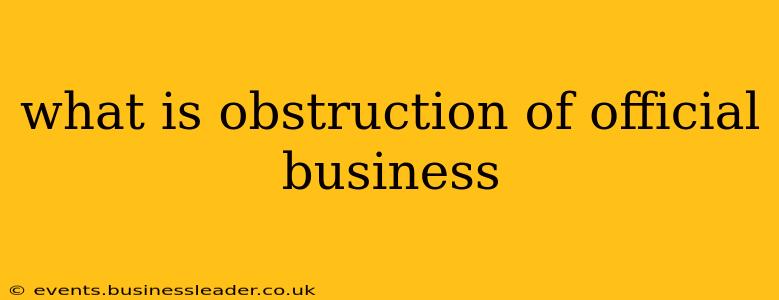Obstruction of official business, also sometimes referred to as interference with government operations, is a crime that involves hindering or impeding a public official in the performance of their lawful duties. It's a serious offense that varies in specifics depending on the jurisdiction, but the core principle remains consistent: preventing or delaying government function through deliberate action is illegal. This isn't simply disagreeing with a policy or peacefully protesting; it's about actively interfering with the legitimate work of government officials.
What Constitutes Obstruction of Official Business?
The precise actions that constitute obstruction can differ significantly, but generally include:
- Physical Interference: This could range from physically blocking an officer from entering a building to assaulting an official attempting to perform their duties. The level of force used greatly impacts the severity of the charge.
- Verbal Harassment or Intimidation: While freedom of speech is protected, intentionally harassing, threatening, or intimidating an official to prevent them from carrying out their duties is illegal. This includes using abusive language or making credible threats of violence.
- False Statements or Misinformation: Providing false information to an officer that hinders their investigation or ability to perform their duty is a form of obstruction. This is particularly relevant in situations involving investigations or emergency response.
- Refusal to Comply with Lawful Orders: Failure to comply with a lawful order from a police officer or other authorized official, especially when it directly impedes their work, constitutes obstruction. This does not, however, apply to orders that are themselves unlawful or unconstitutional.
- Destruction of Evidence: Intentionally destroying evidence relevant to an ongoing investigation or official proceeding is a clear act of obstruction. This can include tampering with physical evidence, deleting digital data, or otherwise attempting to conceal information.
What are the Penalties for Obstruction of Official Business?
The penalties for obstruction of official business vary greatly depending on the jurisdiction, the specific actions involved, and the severity of the interference. Possible consequences can include:
- Fines: Substantial monetary penalties can be levied.
- Jail Time: Depending on the severity of the offense, jail time can range from a few months to many years.
- Community Service: This may be imposed as an alternative or in addition to other penalties.
- Probation: The offender may be placed on probation for a specified period.
What is the Difference Between Obstruction of Justice and Obstruction of Official Business?
While both involve hindering official processes, there's a key distinction. Obstruction of justice generally refers to interfering with the judicial system, such as tampering with a witness or jury. Obstruction of official business is broader, encompassing interference with any government official in the performance of their duties, regardless of whether it's directly related to the judicial system. Think of it this way: obstruction of justice is a subset of obstruction of official business.
How is Obstruction of Official Business Proven in Court?
To secure a conviction for obstruction of official business, the prosecution needs to prove beyond a reasonable doubt that:
- An official act was being performed: The official must have been engaged in legitimate, lawful duties.
- The defendant knew of the official act: The defendant must have been aware that the official was performing their duties.
- The defendant intentionally interfered with the official act: The interference wasn't accidental or unintentional.
- The interference was substantial: The actions must have actually hindered or impeded the official's ability to perform their duties.
The prosecution will typically rely on witness testimony, police reports, video footage, and other evidence to support their case.
Can I be Arrested for Obstruction of Official Business?
Yes, you can be arrested for obstruction of official business. If an officer believes you've committed this crime, they have the authority to take you into custody.
This information is for educational purposes only and should not be considered legal advice. If you face charges of obstruction of official business, you should consult with a qualified attorney immediately.
